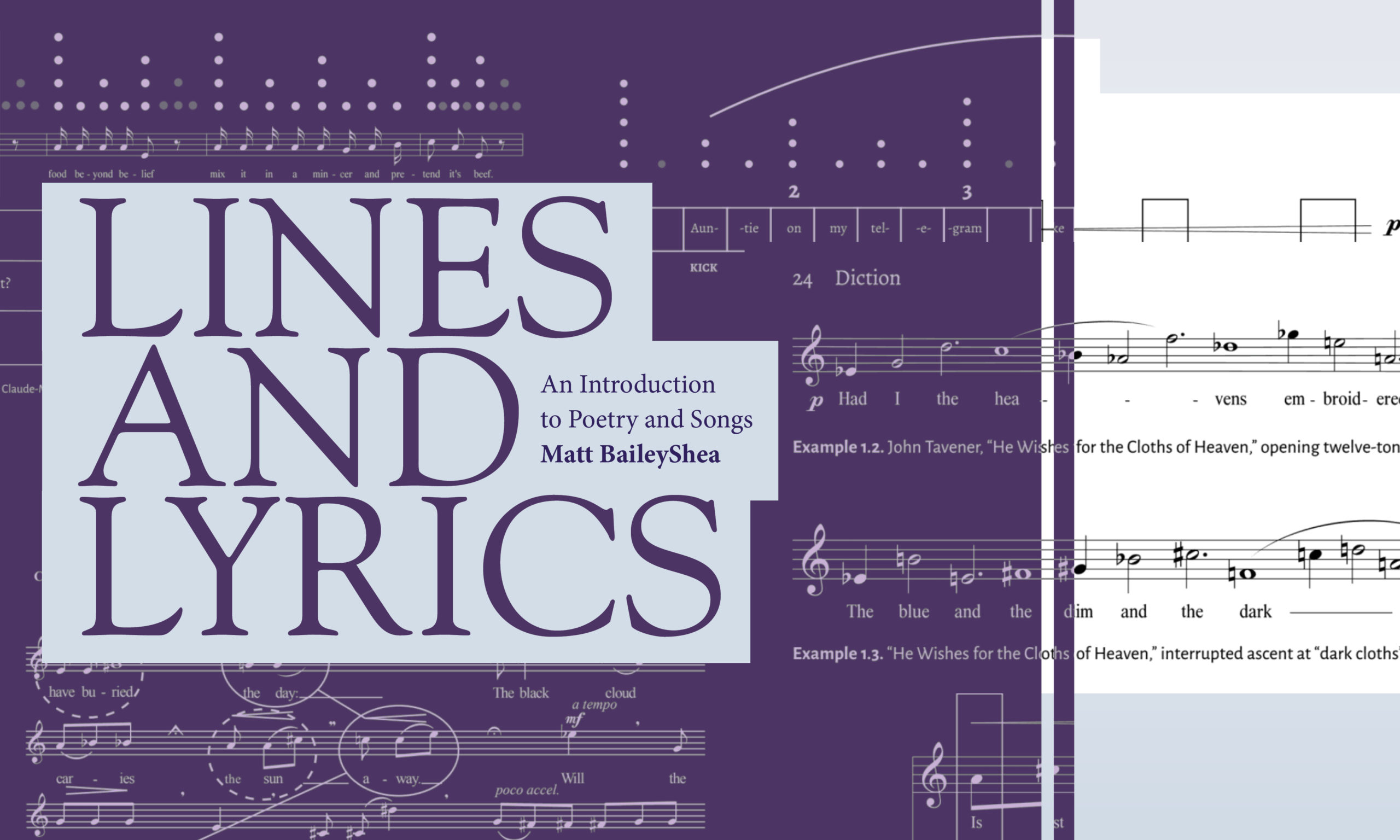|
|
|
|
 (University of Rochester illustration / Julia Joshpe)
Taking a page from poetry to understand the musicReading the opening lines of Van Morrison’s “Into the Mystic,” Matt BaileyShea, an associate professor of music theory, notes that “the song is widely viewed as a classic and a great song. However, it is not great poetry.”
Someone studying Morrison’s songs could be convinced they should overlook the lyrics to focus on other elements, like harmony, texture, vocal timbre, rhythm, and meter. But BaileyShea shows in his new book that with close attention, there is a great deal to savor in Morrison’s words.
In the book, Lines and Lyrics: An Introduction to Poetry and Song (Yale University Press 2021), BaileyShea takes a basic understanding of poetry to explore and draw attention to words, and the sounds of the language to get a deeper interpretation of songs from a wide variety of music styles, from hip-hop to rock to art songs. The goal of the book, he says, is “to get people thinking more carefully about the subtle, sophisticated details of song lyrics, especially in how they relate to the music.”
Learn more in BaileyShea’s Q&A with Jeanette Perez Colby.
State oversight improves end-of-life careNew research on end-of-life care in assisted living finds that in states with less rigorous regulations residents were less likely to die with hospice or at home – important markers of quality of care. The research was led by Helena Temkin-Greener, a professor of public health sciences, and appears in the journal Health Affairs.
Assisted living communities – which are a type of residential long-term care designed for people who need personal and supportive care – have become increasingly popular with older Americans because they can help preserve independence, and with policymakers, because they are a less expensive alternative to nursing homes. However, unlike nursing homes, which are highly regulated by federal and state governments, issues such as minimum staffing levels and oversight for assisted living communities vary greatly depending upon where a person lives.
The new research looks at end-of-life care for 100,783 residents in 16,560 assisted living communities who died in 2018-2019, specifically whether they died at home and under hospice care or after transfer to a nursing home or hospital. Temkin-Greener and her colleagues found that overall 60 percent of Medicare fee-for-service beneficiaries residing in assisted living died at home and more than 84 percent of them had hospice care. The probability of dying at home was significantly lower by dual Medicare-Medicaid status but not by race or ethnicity, suggesting dual status residents may have worse access to high-quality EOL care.
Black residents were significantly less likely to be enrolled in hospice before death; several previous studies have shown that Black families are more likely to advocate for continued and aggressive medical treatment at the end of life, a legacy of mistrust in the health care system. Residents were also less likely to die at home or with home hospice in states with lower regulatory oversight of assisted living communities.
Learn more.
Outstanding PhD dissertationsThe following PhD students have received Outstanding Dissertation Awards from the AS&E Office of Graduate Education and Postdoctoral Affairs:
- Arkajit Mandal, chemistry: Quantum Dynamics Simulation of Photons and Molecules.
- James Rankine, history: Shaving Blackbeard: Reappraising Pirates and Piracy in the Early Modern Atlantic, 1660-1760.
- Matthew McDonald, English: Lyric Body, Lyric Soul: Formal Rhythm in American Sonnets and in the Free Verse of Walter Whitman.
- Patrick Sullivan, visual and cultural studies: TV Sound in the Network Era, 1952-1984.
- Alec Salminen, biomedical engineering: Microvascular Mimetics for the Advanced Study of Endothelial Dysfunction and Leukocyte Extravasation in Inflammation.
NIH director of dental and craniofacial research gives talk todayJoin the Eastman Institute for Oral Health in person to hear from Rena N. D’Souza, director of the National Institute of Dental and Craniofacial Research at NIH, from 4-5 p.m. today, Friday, May 20, in the Jay Stein Boardroom, Room 2-1321, near the Strong Memorial Hospital lobby.
D’Souza is deeply committed to the organization’s mission to advance fundamental knowledge about dental, oral and craniofacial health and disease and translate these findings into prevention, early detection, and treatment strategies that improve overall health for all individuals and communities across the lifespan. Learn more.
Deadline is today to apply for COVID research disruption funding The Office of Equity and Inclusion is providing short-term and immediate funding support for full-time University of Rochester faculty for research activities disrupted by COVID.
Awards will be for up to $5,000 to cover any costs associated with research/research productivity between June 1 and August 31, 2022. Apply by 5 p.m. today, Friday, May 20. Learn more.
Webinar on biopsychosocial innovations in community partnershipsThe Department of Psychiatry’s next 75th-anniversary webinar, “An Overview of Biopsychosocial Innovations in Community Partnerships,” takes place on Tuesday, May 24, from 6 to 7:15 p.m. EDT.
The discussion centers on partnerships over the years between the Department of Psychiatry with the court system, public health services, schools, veterans services, and faith communities. Learn more and register to attend.
Application deadline extended for Del Monte pilot fundingApply today for the 2022 Del Monte Pilot Program. Up to 20 novel basic, clinical, and translational projects in the neurosciences will be supported.
Five programs support these awards including, for the first time, the Intellectual and Developmental Disabilities Research Center. Learn more and apply by Tuesday, May 31.
Learn about design, conduct of clinical studiesFind a host of learning modules developed and curated by the University’s Clinical and Translational Science Institute (UR CTSI) on Blackboard.
These modules provide professionals and trainees across the translational research spectrum with an overview of the key considerations in the design and conduct of clinical and population health studies. Learn more.
Enjoy the holiday!Due to Memorial Day weekend, the next issue of Research Connections will be June 3.
|
|
|
|
|